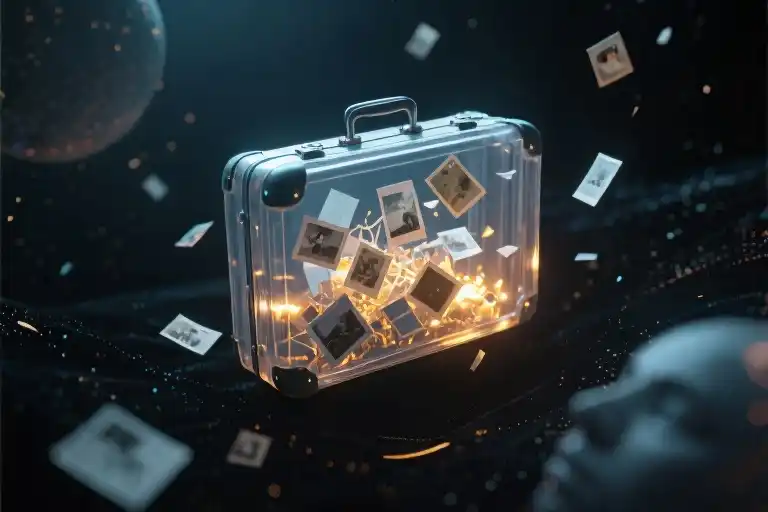The question that should have sparked laughter hangs in the air between us, its weight disproportionate to its casual party game packaging. You know the one – that seemingly innocent Truth or Dare prompt that claws its way past defenses, the kind that makes your throat tighten around the third sip of beer.
We’ve all got that one secret we pray never gets drawn in the social lottery of Truth or Dare. Maybe it’s the credit card debt you’ve been hiding, the ex you occasionally text, or that night you can’t quite remember but can’t completely forget. Mine sat lodged beneath my ribs for years, polished smooth by constant handling until I almost believed it had become part of my anatomy.
Jake’s patio held that particular magic of summer parties where the humidity makes everyone slightly more honest. The indie playlist Jake curated pulsed through outdoor speakers, the bass line syncing with the condensation trails on my beer can. Jessica’s fingers absently traced the knee of my jeans, her laughter at someone’s story ringing brighter than the string lights overhead. This was our element – the easy companionship of shared friends, the unspoken rhythm of knowing when to pass her the guacamole or how she’d tilt her head when feigning interest in sports talk.
We’d played this game before, Truth or Dare. Usually it devolved into harmless revelations about childhood crushes or dares to text embarrassing song lyrics to parents. But parties have their own alchemy, and that night the mixture of too many IPAs, the lingering summer heat, and some unnameable tension in the air transformed our circle into something more dangerous. When Sarah – always the instigator – amended the rules with “no passes this round,” I felt Jessica’s hand still on my leg. The can in my hand developed sudden gravity.
That’s the thing about secrets in relationships. Not their size or even their content, but their persistence. Like a pebble in a shoe you’ve learned to walk around, until one day you realize you’ve developed a permanent limp. The game turns, the question lands, and suddenly you’re measuring the distance between what you’ve built and what you’re about to lose in the space of a held breath.
The Alchemy of a Perfect Night
The third beer always tastes different. Not worse, not better—just different. Like the moment when a song you’ve been absently humming suddenly reveals its lyrics to you in sharp clarity. That’s where I found myself on Jake’s patio, the aluminum chair creaking under my weight as the bassline from some indie band’s deep cut pulsed through the floorboards. The kind of music that doesn’t demand your attention but rewards it when given, much like the woman sitting to my left.
Jess had this way of charging a room without ever appearing to try. Earlier, she’d rescued a dying conversation between Jake’s cousin and a shy graphic designer by asking about font kerning—apparently the designer’s eyes had lit up like we’d handed him a Grammy. That was her gift: finding the exact pressure point to make people bloom. Right now, her fingers were tracing condensation patterns on her bottle, the movement syncopated with the music. Our private rhythm.
Around us, the party moved in the lazy orbits of well-fed people. Someone had brought those miniature quiches that always seem to multiply when you’re not looking. The scent of charred burger patties mixed with jasmine from the neighbor’s yard. Twenty-odd friends in various stages of summer undress, their laughter layering over the music in a way that should have been cacophony but somehow worked. This was the ecosystem we’d built—one where Rachel could debate cryptocurrency with Mark’s vegan roommate while two Tinder dates played footsie under the picnic table.
Then there were the games. Not the organized kind with scorecards and rulesheets, but the living, breathing sort that emerge when tipsy humans cluster. The subtle power plays masked as teasing, the alliances formed over shared disdain for the artisanal IPA. Tonight’s main event had started innocently enough: a dare for Jake to text his ex (“Happy birthday!” with three balloon emojis), a truth about Sarah’s secret karaoke playlist (apparently heavy on Celine Dion). The kind of revelations that glue groups together rather than pry them apart.
Jess squeezed my knee—her version of checking in. Her palm was warm through the denim, a grounding weight as the game’s energy shifted. I didn’t know it then, but we’d already passed the event horizon of that perfect night. The music, the beer, the easy companionship—they were all about to curdle into something else entirely. Not with a bang, but with three simple words: “Truth or Dare?”
(Note: This chapter establishes the “before” state of the relationship and party atmosphere, using sensory details and character interactions to create contrast with the coming rupture. Keywords like “trust issues in relationships” and “modern love dilemmas” are naturally woven into the narrative through context rather than direct mention.)
When the Rules Collapse
The chant started in the corner by the fire pit, a drunken syncopation that slithered through the bassline of the music. “Truth! Truth! Truth!” Twenty-three-year-old scotch breath mingling with citronella candle smoke. My fingers left condensation rings on the aluminum chair arm as the circle tightened. This wasn’t how Truth or Dare worked at Jake’s parties – usually a loose rotation of embarrassing confessions and backyard acrobatics. But tonight the pack smelled blood.
Jessica’s knee pressed against mine, that familiar anchor point. I watched her fingers – the ones that knew exactly how to untangle my headphones without looking – now digging half-moons into her own jeans. The game master (Sarah from the coffee shop? Emma from the gym?) leaned in with predator grin. “Matt. Truth. And we’re doing hard mode tonight.”
Three physiological truths occurred simultaneously: 1) My tongue adhered to the roof of my mouth like wet printer paper 2) A single drop of sweat detoured from my temple into my left ear canal 3) Every hair follicle on my arms achieved perfect vertical alignment. The body knows betrayal before the mind admits it.
Across the circle, Jake’s girlfriend mouthed “sorry” while picking at the label of her IPA. Two guys from the intramural soccer team exchanged the look of men who suddenly regret witnessing vulnerability. The patio string lights developed a strobing effect I’m certain wasn’t there earlier. This is what happens when trust issues in relationships stop being theoretical.
Jess’s microexpressions played at 1.5x speed – eyebrow twitch (confusion), nostril flare (alert), lower lip tuck (calculation). Her hand retreated from my leg with the precision of a bomb squad robot. I’d seen this look exactly once before, when she found her ex’s hoodie in my closet (his name still on the tag, my catastrophic laundry mix-up). That time, resolution took seventeen minutes and two rounds of tequila shots. Tonight’s secret required heavier artillery.
Someone’s phone chose this moment to blast the chorus of a breakup anthem. The universe has a vicious sense of comic timing. As the crowd’s collective inhale reached critical mass, I understood why witnesses to supernatural events often describe time dilation. That suspended second contained entire eras: The Jurassic Period of Our Early Dating, The Renaissance of Shared Apartment Keys, The Ice Age Now Descending.
The secret itself? Less important than the seismic shift occurring in real-time – the way emotional betrayal recovery begins with something as small as a girlfriend’s pinky finger retreating three centimeters. Truth or Dare relationship stories never mention this part: the exact millimeter when “us” becomes “you and me.”
The Aftermath Playbook
The moment the secret slipped out, the party didn’t stop—it transformed. Laughter continued bouncing off Jake’s patio walls, the indie playlist kept shuffling through its algorithmically perfect selections, but the air now carried something heavier than barbecue smoke. I watched the truth ripple through our friend group in real-time, moving faster than the bottle of tequila making its rounds.
First came the immediate circle’s reaction: widened eyes, half-covered smiles, fingers tightening around drink cans. Then the secondary wave as people two conversations over caught wind that something significant had broken. Within minutes, the party developed its own immune response—clusters reforming with me and Jess at their new gravitational center. The music suddenly felt louder, the space between bodies more cramped.
My third beer sat untouched, condensation forming perfect tracks down the aluminum like some pathetic metaphor. Earlier that night, each sip had tasted crisp with possibility; now the thought of lifting it to my lips made my stomach turn. Alcohol’s magic lies in its ability to soften edges, but no amount of hops could blur the sharp contours of what just happened.
Jess stood up abruptly. ‘We should talk outside,’ she said, deploying that universal relationship band-aid phrase we’ve all heard in movies. The walk from patio to driveway took approximately three lifetimes, past friends pretending not to stare. Outside, the streetlights hummed with that particular suburban frequency, the kind that usually feels comforting but now just highlighted how ordinary the world kept being despite my personal earthquake.
Here’s what nobody prepares you for: the logistics of emotional crisis management in social settings. Do you leave immediately and confirm the drama’s severity? Stay and perform normalcy? There’s no protocol for when your truth grenade detonates during a game meant for middle school sleepovers. I watched Jess pace the length of Jake’s Toyota, her shadow stretching and compressing under the uneven lighting, both of us suddenly strangers wearing familiar faces.
Back inside, someone had wisely switched the music to something lyric-heavy and distracting. The party’s volume gradually returned to its previous levels, but with that unmistakable aftertaste of shared witness. This is how modern communities process emotional events—not with direct confrontation, but through the quiet redistribution of attention, the subtle recasting of roles within the group hierarchy.
By the time we decided to call separate Ubers, the secret had fully metabolized into party lore. Tomorrow there would be texts, carefully worded check-ins, maybe even a meme or two referencing the incident without naming names. The real question wasn’t about damage control anymore—it was whether any relationship could survive becoming your friend group’s latest watercooler moment.
The rain taps against the Uber window in uneven rhythms, each drop a tiny hammer against the fragile silence between us. My phone screen lights up with the unfinished draft I’ve been staring at for twenty minutes: “About that secret…” The cursor blinks like a nervous tic, mocking my inability to find words that could possibly bridge this new canyon between me and Jess.
Outside, neon signs bleed color through the wet glass, turning the world into a smeared watercolor of the night we’ve just survived. The party music still hums in my bones, though the actual sound faded when we slammed Jake’s front door behind us. Truth or Dare—that stupid childhood game adults should know better than to play. The third beer sits heavy in my stomach now, warm and flat as the lies I’d convinced myself were harmless.
Jess stares straight ahead at the rain-slicked streets, her fingers absently tracing the edge of her phone case—the one with the chipped corner from when she dropped it during our hike last summer. That day feels excavated from some ancient civilization now. I watch her thumb move in small circles and remember how that same motion used to calm me during thunderstorms. Now the space between our bodies in this backseat might as well be the Mariana Trench.
The Uber driver coughs softly, shifting in his seat. Even he can feel it—the way trust, once broken, becomes this palpable third presence crowding the car. I think about all those relationship articles that promise “three steps to rebuild after betrayal,” their tidy bullet points collapsing under the weight of this actual moment. The truth is messier than any dare could ever be.
My phone dims and goes dark. The unsent message disappears into the void of things we can’t take back. Somewhere between “It was just a joke” and “I never meant for you to find out this way,” I realize secrets aren’t single events—they’re living things that grow in the dark, twisting relationships into shapes that no longer fit.
The car stops in front of Jess’s apartment. She hesitates with her hand on the door handle, and for one suspended second, the rain holds its breath. “When trust becomes something you have to summon the courage to open,” she says quietly, not looking at me, “like one of those stubborn soda can tabs that might break off halfway…”
The sentence hangs there, incomplete. She steps out into the rain, and I watch through water-streaked glass as she walks away without an umbrella—the girl who always carries one, just in case. The Uber pulls away, and all I’m left with is the metallic taste of unspoken apologies and the realization that some truths, once revealed, don’t come with repair instructions.





